12 Best High-Fiber Foods for Digestive Health: Boost Your Gut Now!
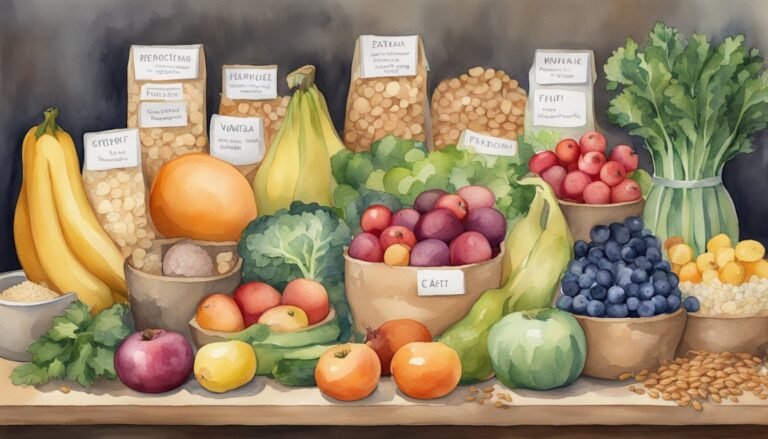
Are you tired of feeling bloated and sluggish? Your digestive health may be crying out for more fiber! Adding high-fiber foods to your diet can work wonders for your gut and overall well-being.
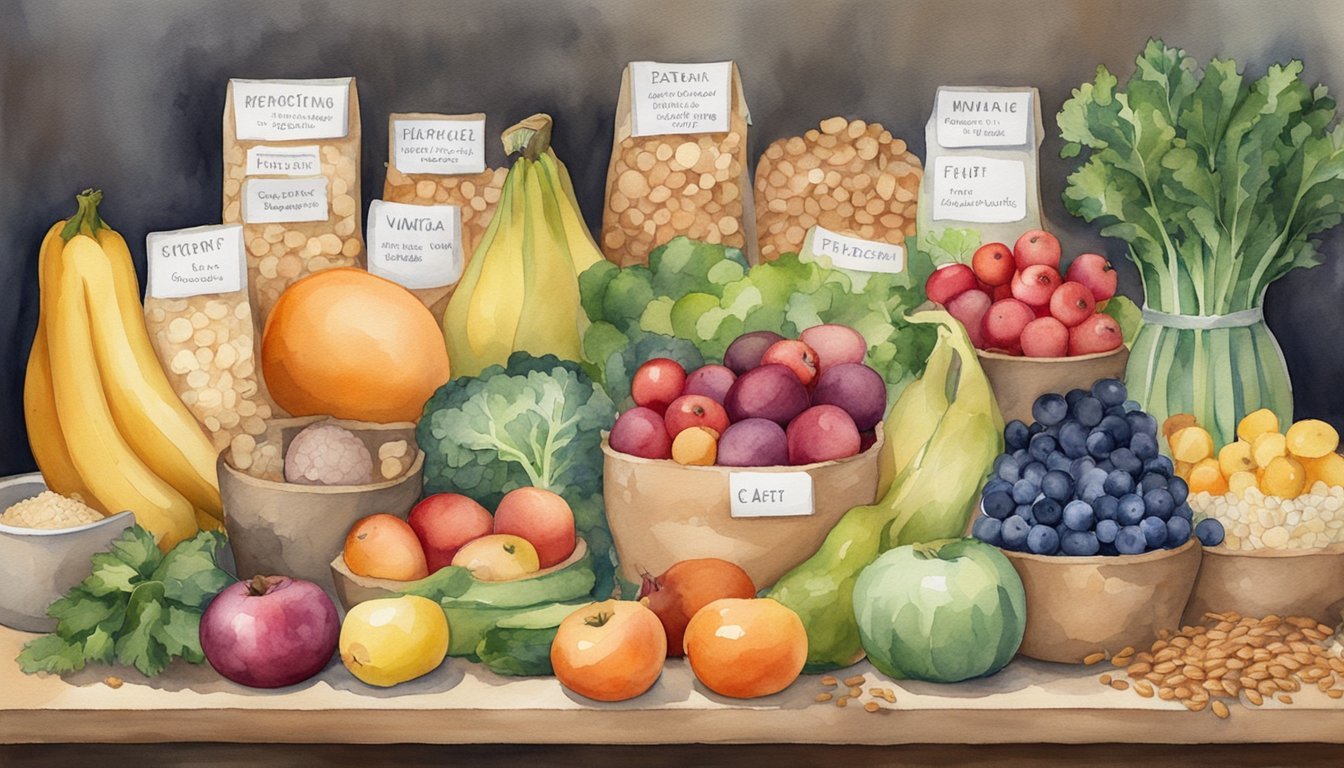
Eating the right fiber-rich foods can help build good gut bacteria and keep your digestive system running smoothly. But with so many options out there, which foods should you choose? Don’t worry – we’ve done the research for you and compiled a list of the 12 best high-fiber foods to boost your digestive health.
Get ready to transform your diet and feel better than ever with these powerful nutrition tips!
1) Chia Seeds
Chia seeds are tiny powerhouses of nutrition.
These small black or white seeds pack a big punch when it comes to fiber content.
Just two tablespoons of chia seeds provide 10 grams of fiber.
That’s about a third of your daily fiber needs in one small serving.
The fiber in chia seeds is mostly soluble fiber.
This type of fiber forms a gel-like substance in your gut.
It can help slow digestion and keep you feeling full.
Chia seeds also contain insoluble fiber.
This kind of fiber adds bulk to your stool and helps food move through your digestive system.
When you eat chia seeds, they absorb water and expand in your stomach.
This can help you feel full and may reduce your food intake.
You can easily add chia seeds to your diet.
Try sprinkling them on yogurt or oatmeal.
You can also mix them into smoothies or use them in baking.
For a simple chia pudding, mix chia seeds with your favorite milk and let it sit overnight.
In the morning, you’ll have a tasty, high-fiber breakfast ready to go.
If you’re looking to boost your fiber intake, chia seeds are an excellent choice.
They’re versatile, easy to use, and packed with nutrients your body needs for good digestive health.
2) Lentils
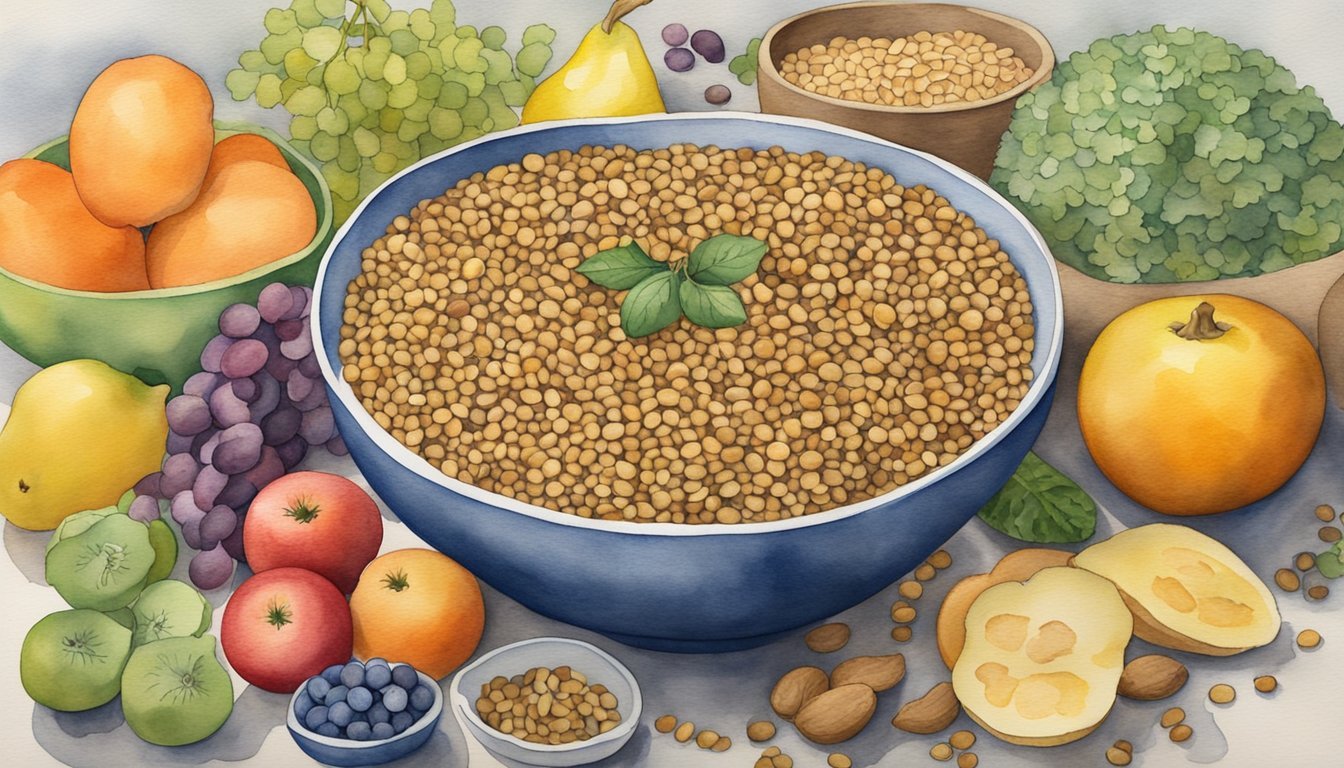
Lentils are tiny nutritional powerhouses that can boost your digestive health.
These small legumes pack a big punch when it comes to fiber content.
A half-cup serving of cooked lentils provides about 8 grams of fiber.
This high fiber content helps keep your digestive system running smoothly and promotes regular bowel movements.
Lentils also support the growth of beneficial gut bacteria.
The fiber in lentils acts as a prebiotic, feeding the good bacteria in your intestines.
You’ll find that lentils are versatile and easy to add to your diet.
They work well in soups, salads, and as a side dish. Learn how to cook perfect lentils for maximum nutrition and flavor.
Beyond fiber, lentils offer other health benefits.
They’re rich in protein, iron, and folate.
This combination of nutrients supports overall health and can help you feel fuller for longer.
Try adding lentils to your meals a few times a week.
You may notice improvements in your digestion and energy levels.
Remember to drink plenty of water when increasing your fiber intake to avoid discomfort.
3) Black Beans
Black beans are a powerhouse of fiber and nutrition.
They pack a whopping 15 grams of fiber per cup, making them an excellent choice for boosting your digestive health.
These beans are versatile and easy to add to your meals.
You can toss them into salads, soups, or use them as a meat substitute in tacos.
Their mild flavor blends well with many dishes.
Black beans offer more than just fiber.
They’re rich in protein, which helps you feel full and satisfied.
They also contain important minerals like iron and magnesium.
Adding black beans to your diet can help regulate your blood sugar levels.
This makes them a smart choice if you’re watching your weight or managing diabetes.
Cooking black beans is simple.
You can buy them canned for quick use or cook dried beans yourself.
If you choose dried beans, soak them overnight to reduce cooking time and make them easier to digest.
For a tasty and healthy meal, try making a black bean burrito bowl.
Combine cooked black beans with brown rice, fresh veggies, and your favorite toppings for a fiber-packed lunch or dinner.
Remember to increase your water intake when eating more high-fiber foods like black beans.
This helps your body process the extra fiber and avoid discomfort.
4) Oats
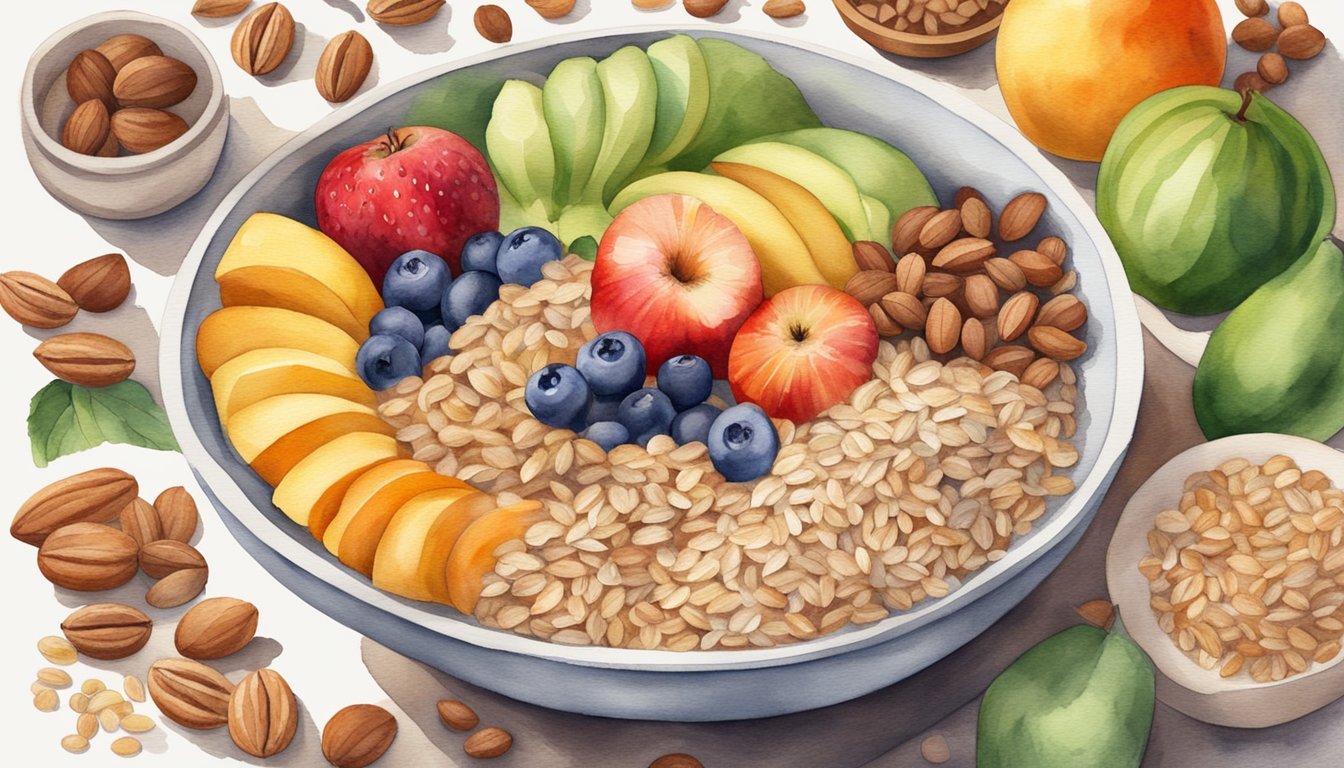
Oats are a fantastic source of dietary fiber.
They contain both soluble and insoluble fiber, which are great for your digestive health.
A single cup of cooked oats provides about 4 grams of fiber.
The soluble fiber in oats, called beta-glucan, can help lower cholesterol levels.
It also slows down digestion, which helps you feel full for longer.
This can be helpful if you’re trying to manage your weight.
Oats are versatile and easy to add to your diet.
You can enjoy them as oatmeal for breakfast, use them in baking, or add them to smoothies.
They’re also a good source of important nutrients like iron, zinc, and B vitamins.
When buying oats, look for whole grain options.
Steel-cut and rolled oats are less processed than instant oats and typically have more fiber.
They also have a lower glycemic index, which means they won’t cause rapid spikes in your blood sugar levels.
Try topping your oats with fresh berries or nuts for extra fiber and nutrients.
You can also use oats to make homemade granola or energy bars.
These make great snacks that can help keep your digestion running smoothly throughout the day.
5) Quinoa
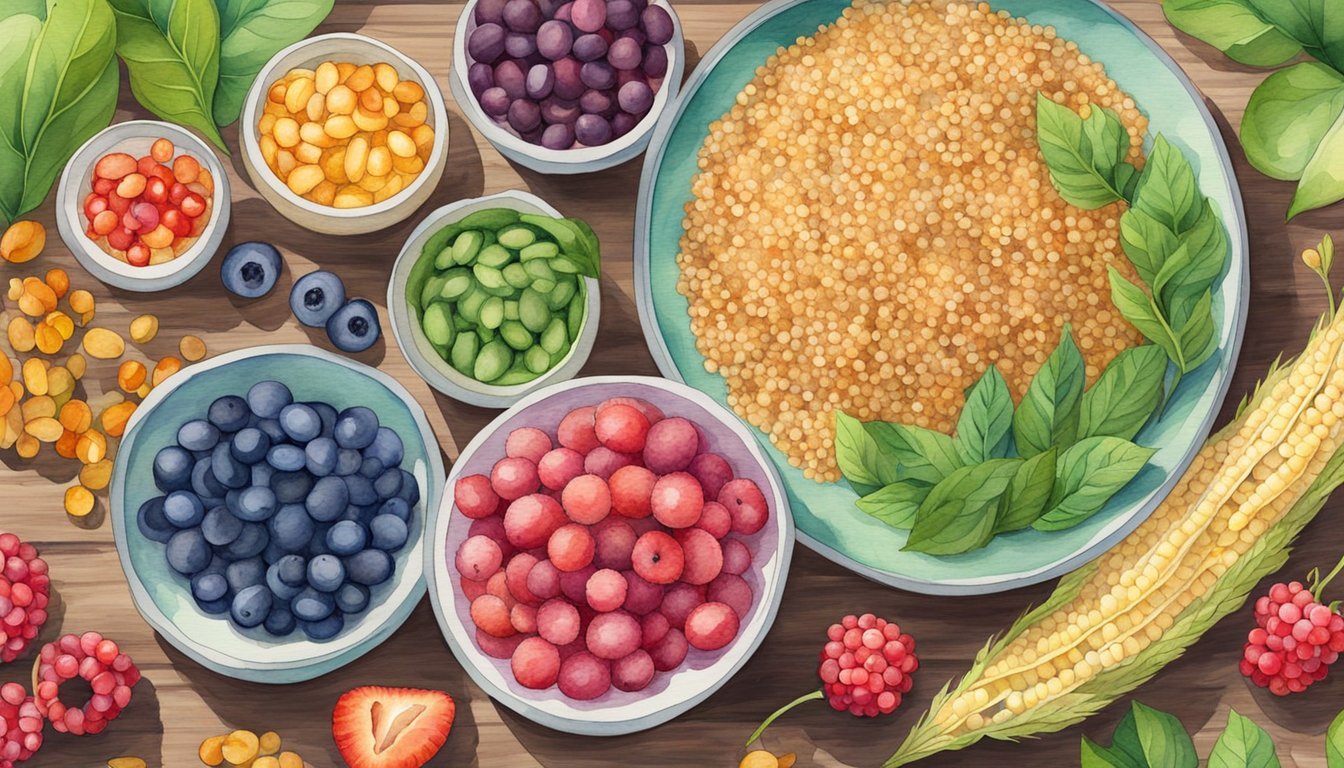
Quinoa is a versatile grain-like seed packed with fiber.
It’s an excellent choice for boosting your digestive health.
One cup of cooked quinoa gives you 5.2 grams of fiber.
That’s about 20% of your daily fiber needs.
Quinoa fiber helps keep your gut moving smoothly.
Quinoa is also rich in protein.
It contains all nine essential amino acids your body can’t make on its own.
This makes it a complete protein source.
You can easily add quinoa to your diet.
Use it as a base for salads or grain bowls.
Mix it into soups or stews for extra texture and nutrition.
Quinoa cooks quickly, usually in about 15 minutes.
Rinse it before cooking to remove any bitter coating.
Then simmer it in water or broth until fluffy.
Try swapping rice for quinoa in your meals.
It has a mild, nutty flavor that goes well with many dishes.
You can even use it in breakfast porridge for a fiber-rich start to your day.
Quinoa also contains other nutrients your gut loves.
It’s high in magnesium, which can help relieve constipation.
Plus, it has iron, zinc, and B vitamins to support overall health.
6) Sweet Potatoes
Sweet potatoes are a tasty and nutritious root vegetable that can boost your fiber intake.
A medium-sized sweet potato contains about 4 grams of fiber, making it a good choice for improving digestive health.
These orange-fleshed veggies are packed with vitamins and minerals.
They’re rich in vitamin A, which supports eye health and immune function.
Sweet potatoes also provide potassium, vitamin C, and antioxidants.
You can enjoy sweet potatoes in many ways.
Try them baked, mashed, or cut into fries.
For a fiber-rich snack, slice them thinly and bake them into crispy chips.
You can even add them to smoothies for a creamy texture and fiber boost.
Sweet potatoes have a natural sweetness that makes them appealing to many people.
This can help you increase your fiber intake without feeling like you’re eating “health food”.
They’re also versatile enough to use in both sweet and savory dishes.
To maximize the fiber content, eat the skin of the sweet potato too.
The skin contains a good amount of fiber and adds a nice texture to your meals.
Just be sure to wash the potato thoroughly before cooking.
Consider adding sweet potatoes to your diet for better digestive health.
They’re an easy and delicious way to increase your daily fiber intake.
7) Avocados
Avocados are a tasty and nutritious addition to your diet.
These creamy fruits are packed with fiber, making them great for digestive health.
A medium avocado gives you about 6-7 grams of fiber.
That’s a good chunk of the daily fiber you need.
Eating foods high in fiber helps keep your digestive system running smoothly.
Avocados are also full of other good stuff.
They have lots of healthy fats, vitamins, and minerals.
These nutrients work together to support your overall health.
You can add avocados to your meals in many ways.
Spread them on toast, toss them in salads, or make guacamole.
They’re versatile and easy to use in recipes.
Eating avocados may help you feel full longer.
This can be helpful if you’re trying to manage your weight.
The fiber and healthy fats in avocados can keep you satisfied between meals.
Remember to eat avocados as part of a balanced diet.
While they’re good for you, they’re also high in calories.
Enjoy them in moderation for the best health benefits.
8) Brussels Sprouts
Brussels sprouts are a powerhouse of fiber and nutrients.
These mini cabbages pack a lot of health benefits into a small package.
A half-cup serving of cooked Brussels sprouts contains about 2 grams of fiber.
This helps keep your digestive system running smoothly.
The fiber in Brussels sprouts feeds your gut bacteria.
This promotes a healthy microbiome and better digestion.
Brussels sprouts are also low in calories but high in vitamins and minerals.
They’re a great addition to any meal.
You can roast, steam, or sauté Brussels sprouts.
Try adding them to salads or as a side dish with your favorite protein.
If you’re new to Brussels sprouts, start with small amounts.
Your body might need time to adjust to the extra fiber.
For more tips on incorporating high-fiber foods into your diet, check out this digestive health guide.
It can help you make the most of fiber-rich foods like Brussels sprouts.
Remember to drink plenty of water when you increase your fiber intake.
This helps the fiber do its job and keeps things moving smoothly.
9) Almonds
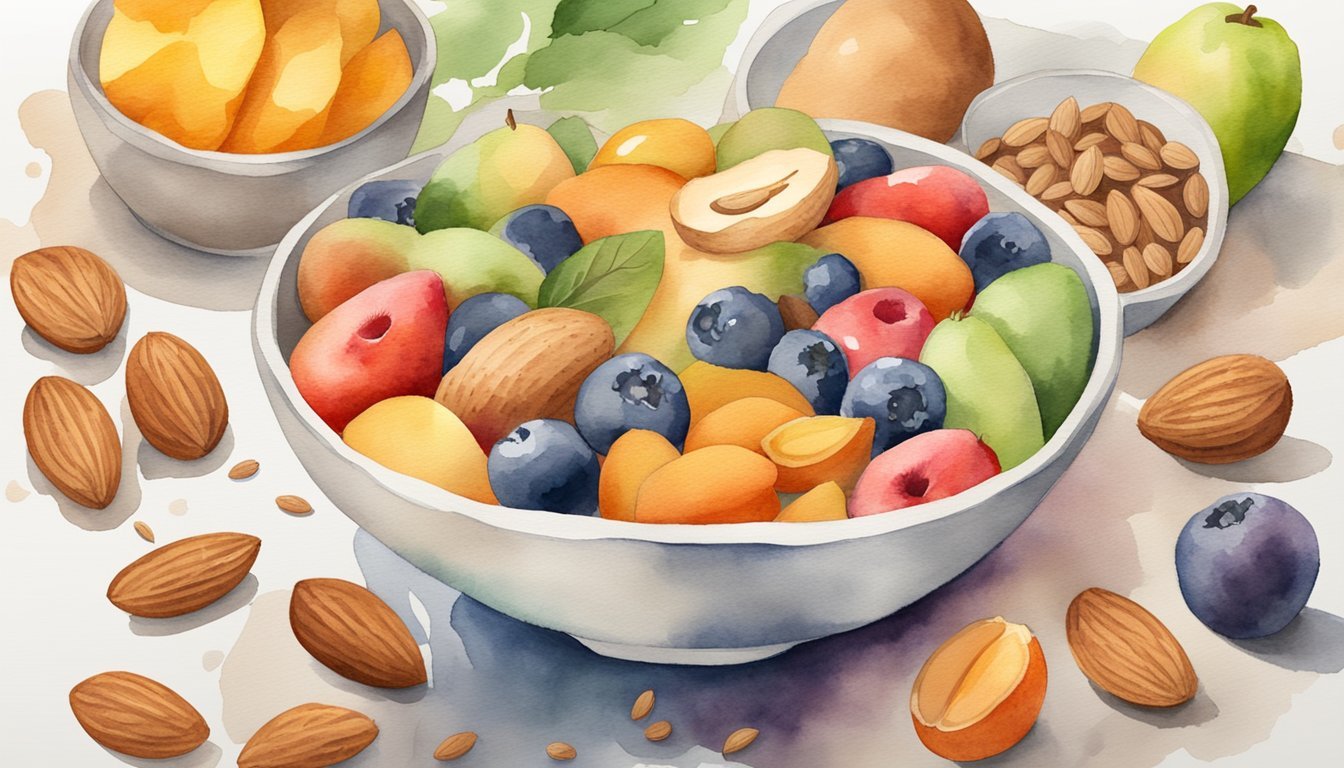
Almonds are a tasty and nutritious snack that can boost your fiber intake.
These crunchy nuts pack about 3.5 grams of fiber per ounce, making them a great choice for digestive health.
You can easily add almonds to your diet in many ways.
Grab a handful as a quick snack, sprinkle them on yogurt, or add them to salads for extra crunch.
They’re also great in baked goods or as almond butter on toast.
Almonds offer more than just fiber.
They’re rich in healthy fats, protein, and vitamins like vitamin E. These nutrients can help support your overall health and keep you feeling full.
Eating almonds regularly may help improve your digestion.
The fiber in almonds can feed good gut bacteria and promote regular bowel movements.
This can help prevent constipation and keep your digestive system running smoothly.
Remember to drink plenty of water when you increase your fiber intake.
This helps the fiber work better in your digestive system.
Start with small amounts of almonds and gradually increase to avoid any digestive discomfort.
10) Raspberries
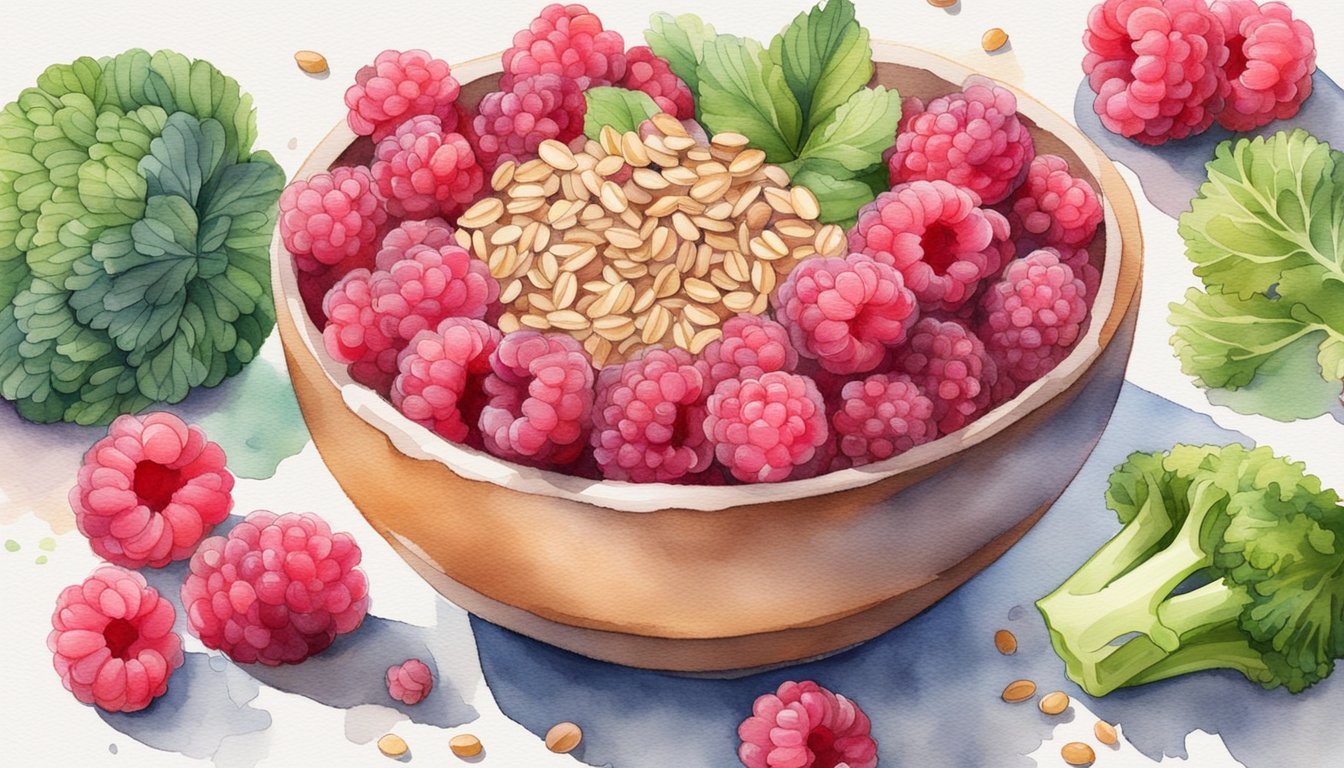
Raspberries are a fantastic choice for boosting your fiber intake.
These tiny berries pack a big nutritional punch. A single cup of raspberries provides about 8 grams of fiber, making them one of the highest fiber fruits you can eat.
The fiber in raspberries is mostly insoluble, which helps add bulk to your stool and keeps things moving through your digestive system.
This can help prevent constipation and promote regular bowel movements.
Raspberries are also low in calories and carbs, making them a great option if you’re watching your weight.
One cup contains only about 15 grams of carbohydrates, with 8 of those coming from fiber.
Beyond fiber, raspberries offer other health benefits.
They’re rich in antioxidants, which can help protect your cells from damage.
They also contain vitamins C and K, and minerals like manganese.
You can easily add raspberries to your diet in many ways.
Try them as a topping for yogurt or oatmeal, blend them into smoothies, or simply enjoy them as a snack on their own.
If you’re looking to improve your gut health, incorporating raspberries into your diet is a tasty and effective way to do so.
Their high fiber content and other nutrients make them a top choice for supporting digestive health.
11) Carrots
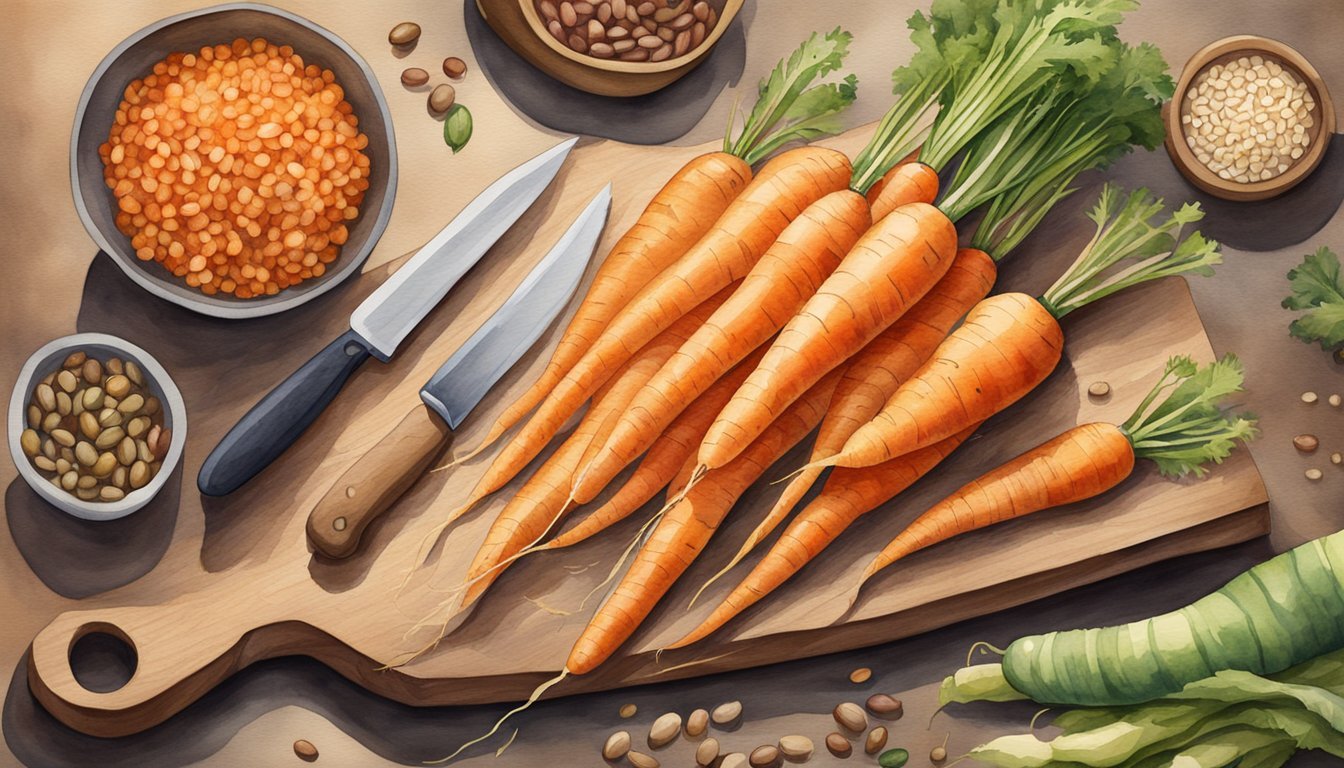
Carrots are a great source of fiber and other nutrients.
They contain both soluble and insoluble fiber, which are important for digestive health.
A medium-sized carrot has about 2 grams of fiber.
The fiber in carrots can help you feel full and satisfied.
This may aid in weight management and promote better digestion.
Eating carrots regularly can also support regular bowel movements.
Carrots are easy to add to your diet.
You can eat them raw as a snack, shred them into salads, or cook them as a side dish.
Try roasting carrots with a bit of olive oil and herbs for a tasty fiber boost.
Beyond fiber, carrots offer other health benefits.
They’re rich in vitamin A, which is good for your eyes and immune system.
Carrots also contain antioxidants that may help protect your cells from damage.
Remember to chew carrots well or cook them slightly to make the nutrients easier for your body to absorb.
Adding carrots to your meals is a simple way to increase your fiber intake and support your digestive health.
12) Broccoli
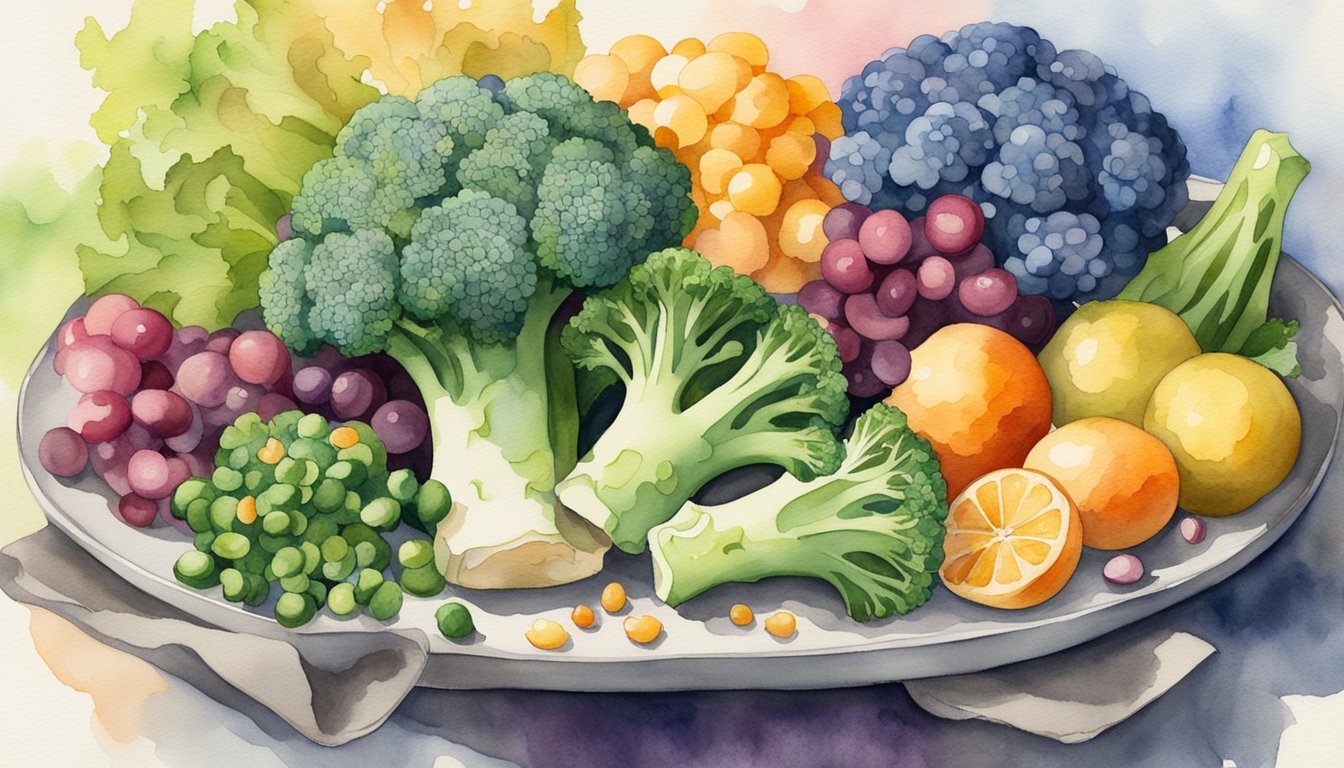
Broccoli is a powerhouse vegetable when it comes to fiber content.
You’ll get over 5 grams of fiber per cup of cooked, chopped broccoli.
That’s a significant amount to help meet your daily fiber needs.
This green veggie isn’t just about fiber.
It’s packed with vitamins, minerals, and other beneficial compounds.
Broccoli is especially rich in vitamin C, which supports your immune system.
You can enjoy broccoli in many ways.
Try it steamed, roasted, or even raw in salads.
Adding broccoli to your meals is an easy way to boost your fiber intake.
Broccoli also contains both soluble and insoluble fiber.
This combination helps keep your digestive system running smoothly.
It can aid in preventing constipation and promoting regular bowel movements.
If you’re looking to improve your gut health, broccoli is an excellent choice.
Its fiber content feeds the good bacteria in your gut, supporting a healthy microbiome.
Remember to drink plenty of water when increasing your fiber intake.
This helps the fiber work effectively in your digestive system.
Importance of High-Fiber Foods
Eating foods high in fiber is key for good health.
Fiber helps your gut work well and can stop digestive problems.
It’s an easy way to take care of your body every day.
Benefits for Digestive Health
Fiber is great for your gut.
It helps you poop more often and makes your stools softer.
This stops you from getting blocked up.
Fiber also feeds the good bugs in your gut.
Eating fiber-rich foods can make you feel full.
This helps you eat less and can help you lose weight.
Fiber slows down how fast your body takes in sugar.
This keeps your blood sugar steady.
Some types of fiber soak up water.
This makes your stools bigger and softer.
It’s easier to pass them.
Other types of fiber speed up how fast food moves through your gut.
Role in Preventing Digestive Disorders
Fiber can stop many gut problems.
It lowers your risk of getting diverticular disease.
This is when small pouches form in your colon.
Fiber also cuts your risk of colon cancer.
Eating more fiber can help if you have irritable bowel syndrome (IBS).
It can ease both diarrhea and constipation.
Fiber also helps stop hemorrhoids by making your stools softer.
For people with Crohn’s disease, fiber might help during quiet times.
But you should talk to your doctor first.
They can tell you how much fiber is right for you.
Types of Fiber
Fiber comes in two main forms that each play important roles in digestion and health.
These types work differently in your body but both offer key benefits.
Soluble Fiber
Soluble fiber dissolves in water to form a gel-like substance in your gut.
This type of fiber helps:
- Lower cholesterol levels
- Control blood sugar
- Promote healthy gut bacteria
- Make you feel full longer
Good sources include oats, peas, beans, apples, and citrus fruits.
When you eat foods with soluble fiber, it slows digestion and nutrient absorption.
Soluble fiber also feeds beneficial gut bacteria.
This supports your immune system and overall health.
Insoluble Fiber
Insoluble fiber doesn’t dissolve in water.
It adds bulk to stool and helps food pass more quickly through your stomach and intestines.
Benefits include:
- Preventing constipation
- Promoting regular bowel movements
- Removing toxins from your colon
You can find insoluble fiber in foods like whole wheat flour, wheat bran, nuts, and many vegetables.
This type of fiber acts like a natural laxative in your digestive system.
Eating a mix of both soluble and insoluble fiber gives you the most health benefits.
Aim for 25-30 grams of total fiber per day from a variety of plant foods.
How to Incorporate More Fiber Into Your Diet
Adding fiber to your diet can be easy and tasty.
You can make small changes to your meals and snacks to boost your fiber intake.
There are also supplement options if you need extra help.
Simple Dietary Changes
Start your day with a high-fiber breakfast.
Choose whole grain cereals or oatmeal.
Add berries or sliced banana for extra fiber.
Swap white bread for whole wheat in your sandwiches.
Snack on raw vegetables like carrots and celery.
Dip them in hummus for added fiber and protein.
Keep a bowl of fresh fruit on your counter for easy access.
Add beans to your soups and salads.
They’re packed with fiber and protein.
Try lentil soup or chickpea salad for a filling meal.
Choose brown rice instead of white.
It has more fiber and nutrients.
Mix in some vegetables for even more fiber.
Fiber Supplements
If you struggle to get enough fiber from food, supplements can help.
Psyllium husk is a popular choice.
You can mix it with water or add it to smoothies.
Methylcellulose is another option.
It’s gentler on your stomach and doesn’t cause gas.
You can find it in powder or pill form.
Inulin is a prebiotic fiber.
It feeds good bacteria in your gut.
You can buy it as a powder to add to drinks or food.
Always start with a small amount of fiber supplement.
Increase slowly to avoid stomach upset.
Drink plenty of water when taking fiber supplements.
Fiber supplements can be helpful, but whole foods are best.
Try to get most of your fiber from your diet.
Talk to your doctor before starting any new supplement.
Frequently Asked Questions
Fiber is crucial for digestive health.
Many foods can help you reach the recommended daily intake and improve your gut function.
What are some high-fiber food options for improving digestive health?
Chia seeds are a top choice.
They pack about 10 grams of fiber per ounce.
Lentils and black beans are also great picks.
They each provide around 15 grams of fiber per cup when cooked.
Oats and quinoa are fiber-rich grains.
A half-cup of oats has 4 grams of fiber.
Quinoa offers about 5 grams per cup cooked.
How can I increase my daily fiber intake to reach 30 grams?
Start your day with a bowl of oatmeal topped with berries.
Snack on raw veggies and hummus.
Add beans to your lunch salad or soup.
For dinner, try a quinoa and lentil pilaf.
Sprinkle chia seeds on yogurt for dessert.
These simple swaps can boost your fiber intake.
What are the top fiber-rich fruits and vegetables I should include in my diet?
Raspberries are fiber superstars.
They offer 8 grams per cup.
Pears and apples with skin are also good choices.
For veggies, try artichokes, broccoli, and Brussels sprouts.
Sweet potatoes with skin are another great option.
They provide about 5 grams of fiber each.
Which specific type of fiber is recommended for optimal gut health?
Both soluble and insoluble fiber are key for gut health.
Soluble fiber feeds good gut bacteria.
Insoluble fiber adds bulk to stool.
Aim for a mix of both types.
Oats, beans, and apples are rich in soluble fiber.
Whole grains and veggie skins offer more insoluble fiber.
Can you list some high-fiber foods that may also aid in weight loss?
Chia seeds can help you feel full.
Lentils and black beans are filling and protein-rich.
Oats provide steady energy and may curb hunger.
Quinoa is a complete protein that’s also high in fiber.
These foods can support weight loss as part of a balanced diet.
What is considered the single highest fiber-containing food?
Chia seeds top the list of high-fiber foods.
They pack about 10 grams per ounce, which is 2 tablespoons.
Flaxseeds are close behind with about 8 grams per ounce.
Both are easy to add to smoothies, yogurt, or oatmeal for a fiber boost.






